Related Research Articles

Cyril M. Kornbluth was an American science fiction author and a member of the Futurians. He used a variety of pen-names, including Cecil Corwin, S. D. Gottesman, Edward J. Bellin, Kenneth Falconer, Walter C. Davies, Simon Eisner, Jordan Park, Arthur Cooke, Paul Dennis Lavond, and Scott Mariner.
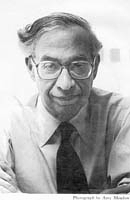
Donald Allen Wollheim was an American science fiction editor, publisher, writer, and fan. As an author, he published under his own name as well as under pseudonyms, including David Grinnell, Martin Pearson, and Darrell G. Raynor. A founding member of the Futurians, he was a leading influence on science fiction development and fandom in the 20th-century United States. Ursula K. Le Guin called Wollheim "the tough, reliable editor of Ace Books, in the Late Pulpalignean Era, 1966 and '67", which is when he published her first two novels in Ace Double editions.
The Futurians were a group of science fiction fans, many of whom became editors and writers as well. The Futurians were based in New York City and were a major force in the development of science fiction writing and science fiction fandom in the years 1937–1945.
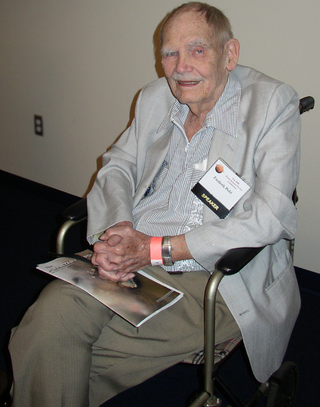
Frederik George Pohl Jr. was an American science-fiction writer, editor, and fan, with a career spanning nearly 75 years—from his first published work, the 1937 poem "Elegy to a Dead Satellite: Luna", to the 2011 novel All the Lives He Led.

James Benjamin Blish was an American science fiction and fantasy writer. He is best known for his Cities in Flight novels and his series of Star Trek novelizations written with his wife, J. A. Lawrence. His novel A Case of Conscience won the Hugo Award. He is credited with creating the term "gas giant" to refer to large planetary bodies.

Damon Francis Knight was an American science fiction author, editor, and critic. He is the author of "To Serve Man", a 1950 short story adapted for The Twilight Zone. He was married to fellow writer Kate Wilhelm.

Judith Josephine Grossman, who took the pen-name Judith Merril around 1945, was an American and then Canadian science fiction writer, editor and political activist, and one of the first women to be widely influential in those roles.
The 1st World Science Fiction Convention (Worldcon) was held on 2–4 July 1939 in the Caravan Hall in New York City, United States, in conjunction with the New York World's Fair, which was themed as "The World of Tomorrow". It was later retroactively named "NyCon I" by Forrest J Ackerman.
The 2nd World Science Fiction Convention (Worldcon), also known as Chicon I, was held on 1–2 September 1940 at the Hotel Chicagoan in Chicago, Illinois, United States.
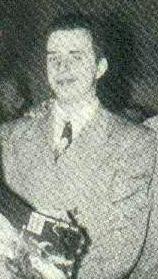
Robert Augustine Ward "Doc" Lowndes was an American science fiction author, editor and fan. He was known best as the editor of Future Science Fiction, Science Fiction, and Science Fiction Quarterly, among many other crime-fiction, western, sports-fiction, and other pulp and digest sized magazines for Columbia Publications. Among the most famous writers he was first to publish at Columbia was mystery writer Edward D. Hoch, who in turn would contribute to Lowndes's fiction magazines as long as he was editing them. Lowndes was a principal member of the Futurians. His first story, "The Outpost at Altark" for Super Science in 1940, was written in collaboration with fellow Futurian Donald A. Wollheim, uncredited.
Leslie Perri was the pen name of Doris Marie Claire "Doë" Baumgardt, an American science fiction fan, writer, and illustrator. She was a member of the Futurians, the influential science fiction fan club.
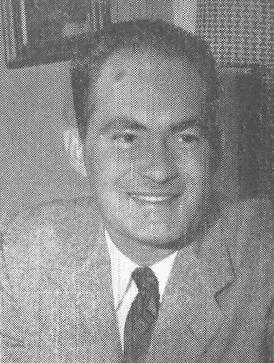
Richard Wilson was an American science fiction writer and fan. He was a member of the Futurians, and was married for a time to Leslie Perri, who had also been a Futurian.

Super Science Stories was an American pulp science fiction magazine published by Popular Publications from 1940 to 1943, and again from 1949 to 1951. Popular launched it under their Fictioneers imprint, which they used for magazines, paying writers less than one cent per word. Frederik Pohl was hired in late 1939, at 19 years old, to edit the magazine; he also edited Astonishing Stories, a companion science fiction publication. Pohl left in mid-1941 and Super Science Stories was given to Alden H. Norton to edit; a few months later Norton rehired Pohl as an assistant. Popular gave Pohl a very low budget, so most manuscripts submitted to Super Science Stories had already been rejected by the higher-paying magazines. This made it difficult to acquire good fiction, but Pohl was able to acquire stories for the early issues from the Futurians, a group of young science fiction fans and aspiring writers.

Science Fiction Quarterly was an American pulp science fiction magazine that was published from 1940 to 1943 and again from 1951 to 1958. Charles Hornig served as editor for the first two issues; Robert A. W. Lowndes edited the remainder. Science Fiction Quarterly was launched by publisher Louis Silberkleit during a boom in science fiction magazines at the end of the 1930s. Silberkleit launched two other science fiction titles at about the same time: all three ceased publication before the end of World War II, falling prey to slow sales and paper shortages. In 1950 and 1951, as the market improved, Silberkleit relaunched Future Fiction and Science Fiction Quarterly. By the time Science Fiction Quarterly ceased publication in 1958, it was the last surviving science fiction pulp magazine, all other survivors having changed to different formats.
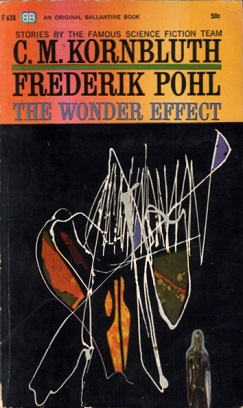
The Wonder Effect is a collection of science fiction stories by American writers Frederik Pohl and Cyril M. Kornbluth, published by Ballantine Books in 1962.
Astonishing Stories was an American pulp science fiction magazine, published by Popular Publications between 1940 and 1943. It was founded under Popular's "Fictioneers" imprint, which paid lower rates than Popular's other magazines. The magazine's first editor was Frederik Pohl, who also edited a companion publication, Super Science Stories. After nine issues Pohl was replaced by Alden H. Norton, who subsequently rehired Pohl as an assistant. The budget for Astonishing was very low, which made it difficult to acquire good fiction, but through his membership in the Futurians, a group of young science fiction fans and aspiring writers, Pohl was able to find material to fill the early issues. The magazine was successful, and Pohl was able to increase his pay rates slightly within a year. He managed to obtain stories by writers who subsequently became very well known, such as Isaac Asimov and Robert Heinlein. After Pohl entered the army in early 1943, wartime paper shortages led Popular to cease publication of Astonishing. The final issue was dated April of that year.
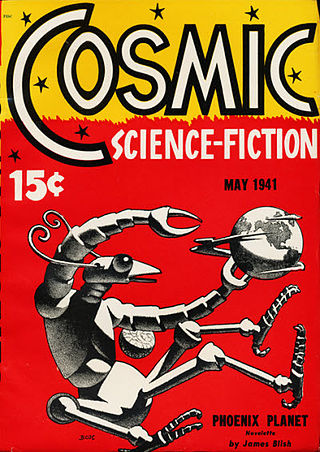
Cosmic Stories and Stirring Science Stories were two American pulp science fiction magazines that published a total of seven issues in 1941 and 1942. Both Cosmic and Stirring were edited by Donald A. Wollheim and launched by the same publisher, appearing in alternate months. Wollheim had no budget at all for fiction, so he solicited stories from his friends among the Futurians, a group of young science fiction fans including James Blish and C. M. Kornbluth. Isaac Asimov contributed a story, but later insisted on payment after hearing that F. Orlin Tremaine, the editor of the competing science fiction magazine Comet, was irate at the idea of a magazine that might "siphon readership from magazines that paid", and thought that authors who contributed should be blacklisted. Kornbluth was the most prolific contributor, under several pseudonyms; one of his stories, "Thirteen O'Clock", published under the pseudonym "Cecil Corwin", was very successful, and helped to make his reputation in the field. The magazines ceased publication in late 1941, but Wollheim was able to find a publisher for one further issue of Stirring Science Stories in March 1942 before war restrictions forced it to close again.

Comet was a pulp magazine which published five issues from December 1940 to July 1941. It was edited by F. Orlin Tremaine, who had edited Astounding Stories, one of the leaders of the science fiction magazine field, for several years in the mid-1930s. Tremaine paid one cent per word, which was higher than some of the competing magazines, but the publisher, H-K Publications based in Springfield, MA, was unable to sustain the magazine while it gained circulation, and it was cancelled after less than a year when Tremaine resigned. Comet published fiction by several well-known and popular writers, including E.E. Smith and Robert Moore Williams. The young Isaac Asimov, visiting Tremaine in Comet's offices, was alarmed when Tremaine asserted that anyone who gave stories to competing magazines for no pay should be blacklisted; Asimov promptly insisted that Donald Wollheim, to whom he had given a free story, should make him a token payment so he could say he had been paid.
The writing team of Frederik Pohl and Cyril M. Kornbluth, both successful science fiction writers in their own right, produced some of the most acclaimed science fiction novels of the 1950s. They were both members of the Futurians.
This is an incomplete list of works by American space opera and science fiction author Frederik Pohl, including co-authored works.
References
- ↑ Davin, Eric Leif (August 25, 2006). Partners in Wonder: Women and the Birth of Science Fiction, 1926-1965. Lexington Books. ISBN 9780739112670 – via Google Books.
- 1 2 3 4 5 6 Page, Michael R. (September 30, 2015). Frederik Pohl. University of Illinois Press. ISBN 9780252097744 – via Google Books.
- ↑ Ashley, Mike; Ashley, Michael; Lowndes, Robert A. W. (January 1, 2004). The Gernsback Days: A Study of the Evolution of Modern Science Fiction from 1911 to 1936. Wildside Press LLC. ISBN 9780809510559 – via Google Books.
- 1 2 3 4 "Joseph Harry Dockweiler (Dirk Wylie) (1920–1949)" (PDF). Chunga through the Looking Glass (25): 12.
- ↑ Knight, Damon (August 29, 2013). The Futurians. Orion. ISBN 9780575111417 – via Google Books.
- ↑ "The Immortal Storm a History of Science Fiction Fandom (1954) Sam Moskowitz (SiPDF)".
- ↑ "Amazing Stories v20n02 (1946 05.Ziff Davis)(cape1736)". May 1946.
- ↑ Williamson, Jack (August 25, 2005). Wonder's Child: My Life in Science Fiction. BenBella Books. ISBN 9781932100570 – via Google Books.
- ↑ Rich, Mark (January 13, 2010). C.M. Kornbluth: The Life and Works of a Science Fiction Visionary. McFarland. ISBN 9780786457113 – via Google Books.
- ↑ Wylie, Dirk (September 23, 2020). Highwayman Of The Void. Amazon Digital Services LLC - KDP Print US. ISBN 9798689630854 – via Google Books.
- ↑ Wylie, Dirk; Doolin, Joseph (September 12, 2020). Highwayman of the Void – via Project Gutenberg.
- ↑ Wylie, Dirk (November 17, 2020). Asteroid of the Damned. Simon and Schuster. ISBN 9781649740854 – via Google Books.
- ↑ Pohl, Frederik; Wylie, Dirk (May 18, 2020). Asteroid of the Damned – via Project Gutenberg.